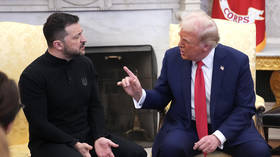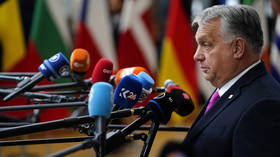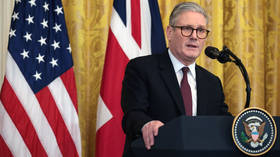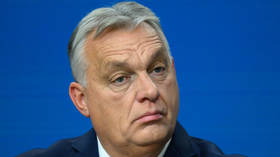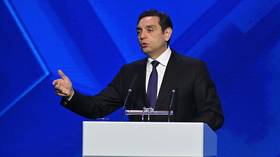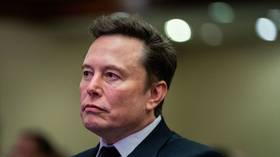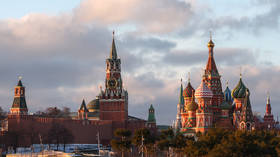Lesser of two evils? The Democrat's dark history of the Hiroshima & Nagasaki 'war crimes'
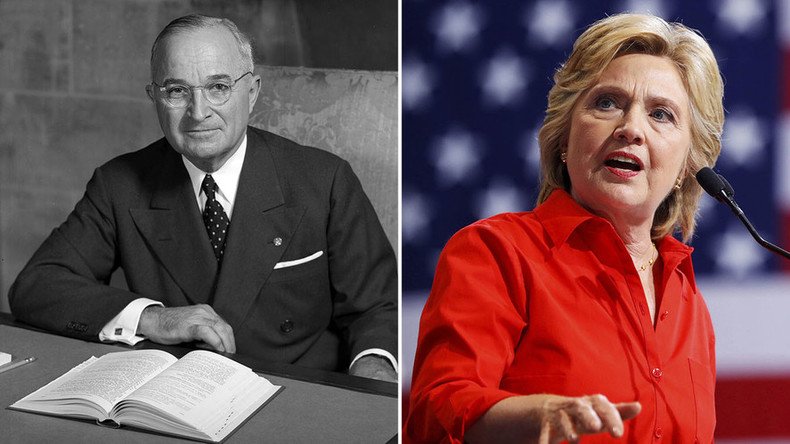
This week marks 71 years since the US carried out what many believe was its deadliest and most horrific “war crime” - the atomic bomb attacks on Hiroshima and Nagasaki which killed, by some estimates, more than 200,000 people.
While the 2016 presidential campaign has raised the global stakes, with both of the main candidates accusing each other of potentially ending the world as we know it, Democrats are presenting their candidate, Hillary Clinton, as the 'lesser of two evils.'
However, the nuclear destruction of Japan may have never happened but for the machinations of DNC insiders in 1944, which removed anti-war vice president Henry Wallace for a "war hawk" of their own, Harry S Truman.
FIRST AND ONLY
The US was the first - and is still the only - nation to use nuclear weapons in warfare.
Just weeks after Truman became vice president with Franklin Delano Roosevelt (FDR), the popular four-term president died and opened the Oval Office to the man from Missouri.
His decision to drop the atomic bombs “Fat Man” and “Little Boy” on hundreds of thousands of people, as well as Japanese military targets (a justification still used to this day), was the result of choices made at the DNC the year before.
Truman’s selection as FDR's running mate at the party’s national convention in 1944 was, as his biographer Robert H Ferrell wrote, "one of the great political stories of our century.”
While the position of vice president is often dismissed, with Roosevelt’s health in decline, their decision to get rid of incumbent VP Henry Wallace changed the course of world history.
In a scenario familiar to Bernie Sanders supporters, DNC insiders who opposed Wallace’s anti-war convictions replaced him with the namesake of the Truman Committee, an investigative congressional body with inside knowledge of the country's rapidly-growing military.
BREAKING: DNC chair Wasserman Schultz to step down amid WikiLeaks revelations https://t.co/u3ziY8zg5wpic.twitter.com/S9D0Lbm3uP
— RT America (@RT_America) July 24, 2016
FDR’s choice of Wallace as his running mate during the 1940 election was controversial in the eyes of party leadership, as the Iowa native was seen as a peace-loving progressive who opposed racial segregation and pushed for a softer approach with the Soviet Union.
Democratic stalwart John Kenneth Galbraith described Wallace as "second only to Roosevelt as the most important figure of the New Deal."
@TheBpDShow Wonder what would have happened IF Henry Wallace had not been dropped for Truman? Bombs not dropped? Dewey win & still get NSA?
— Suzy (@2EPNola) August 3, 2016
SMOKE-FILLED ROOMS
Four years later, in the final months of FDR’s life, DNC bosses knew they had to remove Wallace from the ticket.
Wallace entered the convention with almost half the votes required to secure his re-nomination as the vice president, but party bosses worked hard to get delegates to switch their vote to Truman.
Amidst a pro-Wallace rally that looked likely to escalate into the incumbent winning the nomination, party bosses adjourned the convention until the following day, much to the crowd’s discontent.
@K1er Explained by the Wallace Truman 1944 when fire Marshall changed U.S.history by closing convention moments before nomination. #History
— Donna4843 (@Donna4843) August 5, 2016
DNC bosses needed more time to work on deals to ensure Truman’s selection, often in the 'smoke-filled rooms' of Chicago's infamous Blackstone Hotel.
@redsteeze@ABCPolitics@JohnKasich TBH Truman was the smoke filled room booking an insurance policy against Henry Wallace being POTUS
— CTIronman (@CTIronman) February 14, 2016
Wallace beat Truman on the first ballot, but didn’t have enough votes to secure the nomination.
Party bosses managed to strike enough deals with delegates to switch their vote to eventually secure the win for their guy, Harry S Truman.
FDR and Truman went on to win the 1944 election, but three months after taking office, FDR died of a cerebral hemorrhage and the DNC man Truman was sworn in as president.
#UntoldHistroyOfUnitedStates
— matt539 (@matt5thirtynine) August 7, 2016
1944 DNC convention party bosses conspired to make Truman VP & out anti imperialist Henry Wallace. Familiar?
"COMPLETELY UNNECESSARY"
Eighteen months later, Truman decided to drop atomic bombs on Japan, even though three days prior to the Hiroshima attack, he had been made aware Japan was “looking for peace.”
A number of senior army bosses are said to have been opposed to the dropping of atomic bombs, including then General Dwight D Eisenhower, who later wrote in his memoirs after serving as a Republican president for two terms that he had “voiced to [Truman] my grave misgivings, first on the basis of my belief that Japan was already defeated and that dropping the bomb was completely unnecessary.”
8/9/2016 marks 71st anniversary of atomic bombing of #Nagasaki. Over next 24 hours, horrible things will be said about #Truman, & all true.
— J.Labell (@DC_DeathCult) August 9, 2016
Regardless, Truman gave the go-ahead to drop the bomb on Hiroshima, causing up to 135,000 deaths in the process. Three days later, on August 9, 1945, the plutonium bomb known as “Fat Man” was dropped on Nagasaki, killing an estimated 64,000 people.
Truman argued that the decision to bomb Hiroshima and Nagasaki resulted in a shortening of the war and that it saved American lives, a justification often used in the modern context for the ongoing “war on terror.”
During World War II, The United States held thousands of Japenese-Americans in captivity "to protect" the US from further terror threats
— LO (@1Lovee_GiAna) December 8, 2015
The Democrat noted in his address on August 6, just after Hiroshima was bombed, that “the Japanese began the war from the air at Pearl Harbor. They have been repaid many fold."
Many experts have since argued that there was no need for the second bomb and Truman’s decision to not stop it equates to a “war crime” more than an “act of war” against a military target.
71 years ago Truman failed to pause--and the war crime of Nagasaki followed. My piece: https://t.co/BGxCnc4o0A
— Greg Mitchell (@GregMitch) August 9, 2016
#Nagasaki
— WomenForSurvival (@WMN4SRVL) August 9, 2016
US War Crime Aug 9, 1945 pic.twitter.com/PSfObzIlQU
Telford Taylor, the chief prosecutor at the Nuremberg trials, said of the bombings that “the rights and wrongs of Hiroshima are debatable,” but he had “never heard a plausible justification of Nagasaki,” which he branded a war crime.
“The most racist, nastiest act by this country, after human slavery, was the bombing of Nagasaki,” said author Kurt Vonnegut, who was in Dresden during the bombing of the city.
71 years ago today, a terrorist state dropped the 1st nuclear bomb on a city, killing 140k people mostly civilians. https://t.co/5Qw1Zjv0UH
— Kiran Opal (@KiranOpal) August 6, 2016
General Curtis LeMay, who led numerous bombing campaigns, was also critical of Truman’s decision as he thought it was needless at that stage.
“The atomic bomb had nothing to do with the end of the war at all,” he said in September 1945.
Writer Dwight MacDonald said the dropping of “half-understood poisons” on a civilian population was a result of America’s “decline to barbarism”.
Wallace screwed out of VP in '44 giving us Truman who went on to use Nuclear Weapons, began the Cold War, Korean War https://t.co/itw1jtkEgP
— Old Guy #JillNotHill (@moscms) July 29, 2016
Peter Kuznick, Professor of History and Director of the Nuclear Studies Institute at American University, has gone even further, saying in 2005 that Truman “knew he was beginning the process of annihilation of the species.”
“It was not just a war crime; it was a crime against humanity,” said Kuznick.
In Truman’s eyes, this wasn’t only an illegitimate act of war, but the bomb’s development was, as he said in August 1945, a “new and revolutionary increase in destruction to supplement the growing power of our armed forces.”
"IT IS CLEAR THAT ALTERNATIVES TO THE BOMB EXISTED AND THAT TRUMAN AND HIS ADVISERS KNEW IT." #Hiroshima#Nagasakihttps://t.co/wvwA0iBTUZ
— Rachid de B (@mounibtayeb2014) August 9, 2016
MILITARY-INDUSTRIAL COMPLEX
In the modern context, it is Republicans who are perceived as the warmongers and profiteers by promoting bigger military budgets, but historian Gareth Porter believes the military-industrial complex started with the DNC and Truman, something which Eisenhower famously warned the US public about in his farewell address in 1961.
Pointing to the preceding decade, Eisenhower noted how a “permanent armaments industry of vast proportions” had come into being in the US. The general-turned-president was filled with foreboding, having seen firsthand the damage such advancements as the atomic bomb and Truman’s decision to deploy it had caused.
While acknowledging “the imperative need for this development,” Eisenhower made clear that people “must not fail to comprehend its grave implications.”
“We must guard against the acquisition of unwarranted influence, whether sought or unsought, by the military-industrial complex. The potential for the disastrous rise of misplaced power exists and will persist,” he said.
Seven decades on from the DNC’s decision to push Truman as VP knowing he’d be the Commander-in-Chief a short time after, military spending has continued to increase, reaching $602 billion in 2015, regardless of which party controls Congress or occupies the White House.
READ MORE: Slush funds, secrets and splurges: How Pentagon budgets keep getting bigger
In May 2016, Barack Obama became the first sitting US president to visit the memorial of the bombings in Hiroshima. While many Japanese believe the US owes them an apology, none was offered by the Democratic president.
"I want Obama to say 'I'm sorry.' If he does, maybe my suffering will ease," said Eiji Hattori, 73, who survived the bombing of Hiroshima.
"We have a shared responsibility to look directly in the eye of history. We must ask what we must do differently to curb such suffering again," Obama said in a speech.
He didn't apologize for the atomic bomb dropped on #Hiroshima in 1945 https://t.co/mKXcFmym01#ObamainJapanpic.twitter.com/qdgz8pPSJM
— RT America (@RT_America) May 27, 2016
"NO MORE WAR"
Much like the division caused by the DNC’s push for Truman, the 2016 convention was also a tumultuous affair for the party, with Sanders supporters opposed to Clinton being chosen as the Democratic nominee, many believing she too was the embodiment of the military-industrial complex, holding up “No More War” signs from the floor.
Vote for Hillary #Clinton: Vote for the Military-Industrial Complex and World War. https://t.co/b5kyhfatI1pic.twitter.com/PEteAFVw2D
— Enrico Ivanov (@Russ_Warrior) August 9, 2016
2] Clinton is the poster child for both the military-industrial complex and Wall Street;
— thoughtcrime (@RawDawgBuffalo) August 8, 2016
HRC "just might be the top salesperson for the military-industrial complex in US history" https://t.co/EEdLRUeL9Phttps://t.co/RdQ2IsXUbb
— Holly Blomberg (@HollyBlomberg) August 7, 2016
The CIA & military industrial complex are totally going to endorse Hillary Clinton shes their Manchurian candidate & Trump is their excuse.
— Domenica Stone (@domenicaxx66xx) August 5, 2016
Jeffrey Sachs, director of the Center for Sustainable Development and Sustainable Development Solutions Network, described Clinton as “the Candidate of the War Machine,” in a blog for the Huffington Post.
Both Clinton and the Republican presidential nominee Donald Trump have attacked each other over how they would handle a decision that Truman faced in 1945.
Raising the issue of nuclear weapons during her acceptance speech at the Democratic National Convention, Clinton said Trump couldn't be trusted.
"A man you can bait with a tweet is not a man we can trust with nuclear weapons," Clinton said.
Most-Tweeted moment of @HillaryClinton acceptance speech: "A man you can bait with a tweet is not a man we can trust with nuclear weapons."
— Twitter Government (@gov) July 29, 2016
In response, Trump has raised questions over how Clinton would be with the "nuclear codes" at her disposal, describing her as "totally unhinged."
"She's unbalanced. And all you have to do is watch her, see her, read about her," Trump said during a campaign rally in New Hampshire on Saturday. "She will cause — if she wins, which hopefully she won't — the destruction of our country from within."
Political analyst and Clinton supporter Jonathan Alter wrote the Democrat “would stick with the world order that has served us so well.”
“I’m proud to stand by NATO in any threat they face, including from Russia,” Clinton said in her acceptance speech at the convention, adding that Trump "wants us to fear the future and fear each other. Well, a great Democratic President, Franklin Delano Roosevelt, came up with the perfect rebuke to Trump more than 80 years ago during a much more perilous time: ‘The only thing we have to fear is fear itself.’”



